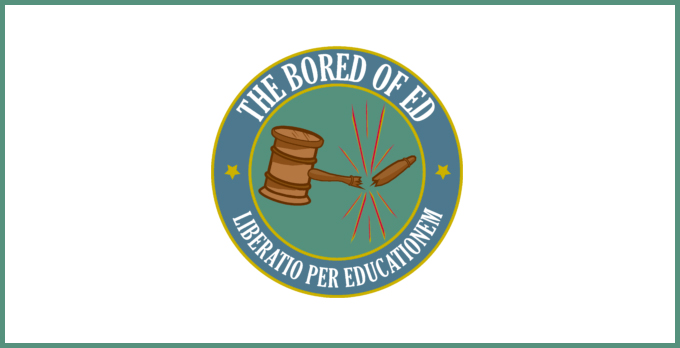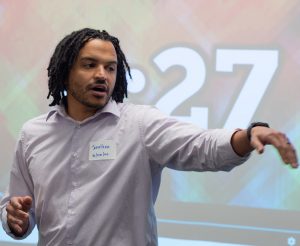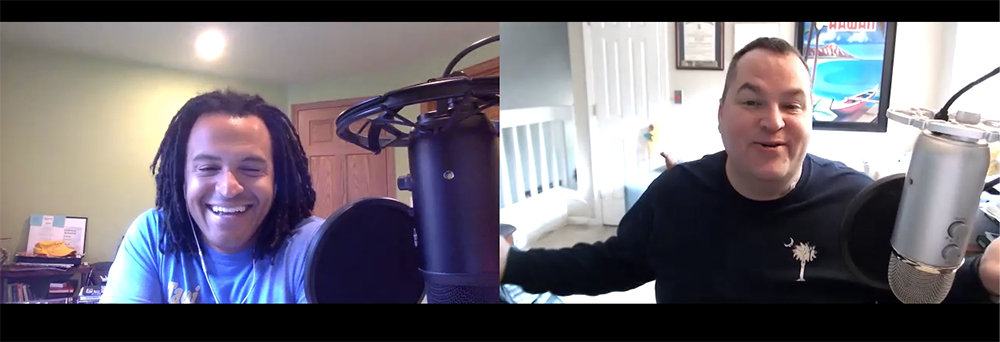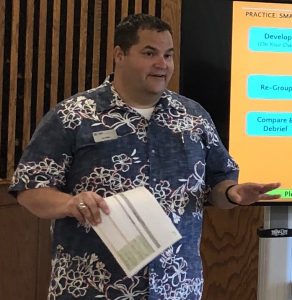74 Interview: Hosts of ‘Bored of Ed’ Podcast on Post-COVID School Reimagined for Justice

See previous 74 Interviews: Author Jal Mehta on the value of teaching, journalist Paul Tough on class, race and the pursuit of college, Professor Rucker Johnson on how school integration helped black students and the full archive of 74 interviews.
* Cue brassy rendition of ‘The Wheels on the Bus,’ complete with drum kicks, record scratch *
“Welcome to the Bored of Education where troublemakers and system-breakers gather to discuss how they are dismantling inequity in public education.”
So begins each episode of Jonathan Santos Silva and Doc Miller’s new podcast, the Bored of Ed, which just wrapped up its first season. Streamed not just across the country, but around the globe, and available on Apple Podcasts and Spotify, this new series asks whether COVID-19, with all its tragic losses, may also be the disruption that our education system needed to promote equity and, in the words of its hosts, liberation.
Over the course of Season 1’s 12 episodes, Santos Silva, a former math teacher and father of four who founded the Liber Institute, and co-host Miller, who works at The New Teacher Project and has taught for nearly two decades, speak with leaders of color in the education space on how we might re-imagine our school system to better serve students and families.
The 74’s Asher Lehrer-Small caught up with the two hosts — Santos Silva beaming in from his home in South Dakota and Miller from his in Indiana — to learn their takeaways from Season 1 and hear what’s next for the podcast. This interview has been edited for length and clarity.
The 74: Jonathan, you began your career in education teaching math on the Pine Ridge reservation in South Dakota. How did that experience inform the perspective that you take forward now?

Santos Silva: I got the opportunity to go to South Dakota (through Teach For America). I had never been to South Dakota. I grew up in New England, Massachusetts. The whole middle of the country was unheard of, unseen territory for me. When I landed in South Dakota and went to the reservation, it was like a culture shock, but in a good way. You get to South Dakota, it’s a small town. Every car going by is the parent of someone in your class or it’s the auntie, the uncle, the grandma. So that changed things. I learned about the value of family and relationships.
So that has really influenced the way I try to lead … everything that I’ve done since probably can tie back to something I learned or someone who encouraged or inspired me from the reservation.
And shifting gears to the podcast, it’s a really clever name, ‘The Bored of Ed.’ Can you explain the meaning behind it and where it comes from?
Santos Silva: I’m really fortunate that, the way I was made, I excelled in the academic setting. Even though depending on what stereotypes or biases you subscribe to, I ought not to have excelled.
My parents, neither one of them had college degrees. My mom had a high school diploma and my dad was a dropout who ended up getting the GED through the military later. They didn’t know the first thing about FAFSA forms or what it takes to get into college, but they kept that mantra going.
So I found success academically and thrived. But I realized very early on that I was the exception to the rule, and I got tired of it. I got tired of having to explain why I wasn’t someone special. That my friends, my cousins, my neighbors, they were just as smart and talented that I was, but the system wasn’t designed for them to succeed. I was tired of that.
I was tired of seeing on the cable news, when you have an education topic, as infrequently as you may have one, it’s the same people. It’s like Fox News, MSNBC, CNN, they’ve got like two Black friends and they always call them. It doesn’t matter what the topic is. And I’m like, there are really brilliant Black, Latinx, Southeast Asian, Indigenous educators all over the country who know their stuff. So why aren’t we talking to them?
So that’s where the ‘Bored of Ed’ came from. It’s just, I was tired of it. We’re tired of the same old reforming conversation and we want to talk about something different. We want to talk about education with the people who really do the work.

One explicit goal of the podcast is to highlight the voices of BIPOC (Black, Indigenous, and people of color) folks who are leaders in the education space. In this moment, why is that especially important?
Santos Silva: It’s not so much that it’s important now. It’s been important.
When I was teaching in Indian country, white people led almost every professional development. White investors who had never been to the reservation were spending money on the curriculum that they thought was best for our students. And I’m thinking, ‘There are elders right here, educators right here, who know our kids, who know our community, and understand our context. They would be invaluable to our work.’
So it’s not so much that it’s important now. It’s been important. So I figured, ‘Well, it’s my podcast, right? There’s no program director. There’s no advertising person that’s going to say you can’t say that because we can’t sell an ad on that.’
I wanted to talk to the people we should have been talking to all along … What would it look like if we gathered our power together?
Listen to Episode 1 of the Bored of Ed.
One theme that comes up in a number of episodes is customization to meet individual student needs, whether those are the emotional needs, learning style needs, well-being, or any number of other factors. After talking to so many experts, what are your thoughts about how to go about doing that in the classroom?
Santos Silva: More important than a prescription, I think educators need to become design thinkers. They need to conduct empathy interviews with as many folks in their community, the students themselves, the people who send them to school, their parents or grandparents, their guardians, their elders.
What are the ways we can have one-on-one conversations that build power?
If you see the uncle of some of your students at every basketball game, and you see him at parent conferences, how do you have the conversation with him that unlocks whatever opportunities there are to become an active and engaged leader in the community? What are the specific skills you personally bring to the table? What skills and perspectives do you lack?
Customization and personalization shouldn’t become some extra add we do, so much as just living in relationship with the kids that we’re here to serve.

Miller: What I take away from many of the episodes as a person who may not share the same identity as the community with which my decisions will have an impact is I need to listen.
I need to recognize that my identity is not divorced from this, right? … So if I am a white leader in a predominantly Black community, we need to listen to Black kids, Black parents, Black families, Black communities to understand what customizations need to be had.
If I make the decisions based solely on my lens, we’re probably going to get what we always got and that’s not working. And so I challenge anybody who listens to the podcast to consider their identity as the lens through which they’re seeing their work in the world.
That reminds me of Episode 8, where your guest Ron Rapatalo of Edgility Consulting talked about youth voice. He said the most frustrating thing for him is when adults forget how stifling it was to be ignored as a youth in the classroom. So then how do we build classrooms and schools that better integrate the voices of students?
Santos Silva: It definitely starts with respecting the young people.
We listen to people or we buy their books or we watch the stuff they produce because we respect them. Because what they say matters to us. And doing things the way we do them, almost as if the kids’ opinions don’t matter, is a form of disrespect.
These kids … saw the unarmed people, Black people, being killed on video. They read about Black, transgender women being disproportionately impacted by violent crime and murder … I can’t assume that I know what they need, I can’t assume that they’re ready to learn what I want to tell them.
So I just think we should start with that premise of respect, that this young person in front of me is worthy of my respect. I should ask, “What do you need? What do you want? What can I do to get you ready to learn?”
Listen to Episode 8 of the Bored of Ed.
Miller: I think it was Malika [Malika Ali, director of pedagogy at the Highlander Institute] who, on her episode, referred to the factory model of education. And if we think about that analogy, everything gets stamped the same, everything gets the same addition on it. But what we don’t think about is at the end of the line, if something doesn’t come out the “right” way, they throw it in the trash. And with the education system, if you don’t come out the end looking like every other one, well, sorry.
We need an artisanal model of education. Where it’s the kid that gets the most respect. Because that’s what’s being molded. That’s what’s being formed. That’s where the value of everything is.
To me, it’s a paradigm shift. It’s harder. It requires more resources, and it requires those of us who are in the system to re-imagine our role in it. Some of the equipment in the factory model just is not going to be useful anymore. So that’s the stuff that should be thrown away, not the product at the end.
More specifically on the COVID pandemic and race, of course the pandemic is inseparable from its sibling pandemic of systemic racism. That came up directly in Episode 6 with David Johns, executive director of the National Black Justice Coalition (which was recorded soon after Jacob Blake was shot in the back seven times by a Wisconsin police officer). What’s most memorable to you from that episode?
Santos Silva: I think that episode was memorable because of the timing in which it occurred. With David, the dual pandemics collided.
The energy of that episode was just different. If I had to describe it, David’s episode was like Tom and Jerry when you have one of those bombs with the long fuse. You just knew it could go off at any moment because, how much can we expect people to take?
You’re looking at all this stuff unfold, Black people are dying disproportionately or Native people are dying. We see all these people getting killed. And most of them are on video. So when you talk to David…. everything goes back to the kids.
How are we preparing to heal our children? How are we preparing to talk to our children about what they witnessed? Like we said, they saw the shootings on their phones. So that’s what sticks out to me about that episode.
When it comes down to the babies, to the young people that we serve, [David]’s deadly serious. Deadly serious.
Listen to Episode 6 of the Bored of Ed.
Doc, in some episodes you have advised white listeners on how to sit with difficult truths. As a white listener myself, I have found those moments useful. What message would you give to white listeners who are looking to grapple honestly with white supremacy and institutional racism in education?
Miller: For those who are committed to equity … we’ve got to go into spaces and say, “I’m going to listen. And I am going to believe what this person says is their actual experience.” And if something comes into our head saying, “No, that’s not really how it is,” stop that thought and just listen. Just listen to what is said and believe their experience, because that’s where you’re going to connect.
I referenced a book by Dolly Chugh a lot on the podcast called The Person You Mean to Be that speaks to this experience. If you’re hearing something that challenges you and your first instinct is to debate, recognize that that’s your brain doing what brains do. Your brain is going to spit out some cortisol and it’s going to give you that hijack feeling, that amygdala thing, and your instincts are to fight, flight or freeze.
That doesn’t make somebody a bad person. That just makes you human. What makes you a developing, growing person is the ability to recognize that that’s happening and still live in that space and still listen to other people.
We can be “good-ish” people, as Chugh says, by walking toward that discomfort and exploring it.
Back to the broad view, this podcast re-imagines how school might look 20 years from now after the disruption of COVID. You even have the conversation going on social media with #BackToBetter. Now schools are back a month-plus into the school year. What are you seeing that encourages you?
Santos Silva: Not all kids have had a worse time in the pandemic. Some kids have excelled because for the first time, no one’s policing every single body movement. They can be a fidgeter. They can get up out of their seat … And from many teachers, instead of “Simplify this radical,” it’s been “How are you feeling today? How’s your family?” We’re starting with humanity.
Another area where I’m especially excited is when families are leaning into community-based approaches. I’ve seen three different pods sprout out here in South Dakota that are led primarily by Lakota or Dakota moms. Families are driving this. And so this narrative around wealthy white people doing pods and just concentrating wealth, that’s a conversation that we do need to have, but what’s not being reported are the ways that families of color are also exercising their power to provide and create spaces for their students.
It’s not just on the reservation. I read an awesome story about a mom out in Connecticut who started an organization to bring together homeschool families of children of color, saying, “If you’re not going to provide the trauma sensitive, or culturally responsive, or customized learning experiences that my child deserves, then I can do it.”
They know their children, they love their children, and they’re going all in for their kids. That’s a model for us as educators.
People are tired. They’re bored. They’re bored of ed like we are. And so they’re not going to just go back to whatever janky old back-to-school plan the district came up with. They’re opting out of that and taking on their own liberation.
What’s what’s next for the podcast? Is there a next season coming? Without spoiling anything, what should listeners expect?
Miller: For sure, there will be a Season 2.
Santos Silva: There’s so many more voices to hear. There’s so many more stories to tell. The Bored members are so amazing. There’s so much more ground to cover.
I just think the only limit to what we do with The Bored of Ed is going to be our creativity.
Get stories like these delivered straight to your inbox. Sign up for The 74 Newsletter

;)

